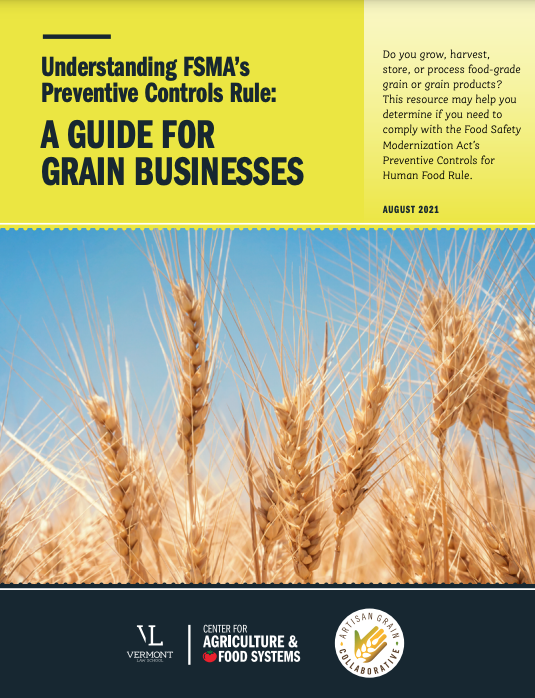Developed by the Artisan Grain Collaborative and Vermont Law School’s Center for Agriculture and Food Systems, “Understanding FSMA’s Preventive Controls Rule: A Guide for Grain Businesses” empowers grain farmers, processors, and food manufacturers to understand and comply with federal food safety laws.
Today, the Midwest-based Artisan Grain Collaborative (AGC) and the Center for Agriculture and Food Systems (CAFS) at Vermont Law School released a new guide for food-grade grain farmers and processors that breaks down complicated federal food safety regulations related to the Food Safety Modernization Act’s (FSMA) Preventive Controls for Human Food Rule (PCR). Titled “Understanding FSMA’s Preventive Controls Rule: A Guide for Grain Businesses,” the guide aims to help farmers and processors identify which food safety requirements apply to their particular operations and assist them in understanding what they need to do to comply as they work to build local and regional food systems.
“I’ve been hearing from farmers and food businesses in the Artisan Grain Collaborative network who are anxious to ensure they understand and comply with new food safety regulations rolled out in the last several years,” said AGC Executive Director Alyssa Hartman. “This resource is an important step toward securing a foundation for food safety regulation within regional grain systems.”
FSMA, which became law in 2011, has been the most sweeping overhaul of U.S. federal food safety laws in seven decades. For businesses conducting food processing and handling, a key component is the Preventive Controls for Human Food Rule, which requires them to evaluate possible food safety hazards, take action to prevent or reduce those hazards, and create monitoring systems to ensure the actions they take are effective.
It can be challenging for small- and medium-sized farms, which are often multi-faceted businesses that store, process, distribute and market foods, to determine if and how the PCR applies to them. “The regulatory definitions for what constitutes a farm versus a processing facility are very specific and dependent on the activities conducted,” said Margaret Rossano, a Vermont Law School student who researched and helped develop the guide. “This resource aims to assist operators in understanding the line between a farm and a facility and whether the Preventive Controls for Human Food Rule applies.”
The guide includes:
• background information on the evolution of regional grainsheds and key terminology;
• a flowchart to help grain farms and businesses determine what type of entity category they fall into according to the regulatory language;
• information specific to farms, processing facilities, retail food establishments, and restaurants;
• information about how the Preventive Controls for Human Food Rule applies to various entities that process grains; and
• a discussion of how particular activities fit within the rule and helps producers understand if and how their activities make them subject to it.
“As a farmer who has built an on-site flour mill, FSMA compliance has been a source of anxiety,” said Harold Wilken, an AGC member and co-owner of Janie’s Farm and Janie’s Mill. “I want to make sure we’re doing the right thing, but it hasn’t been clear to me how to be sure I’m doing that. This resource is very helpful in understanding what the rules require, and where to go for more information.”
The guide is available at: vermontlaw.edu/grain-guide.
About Artisan Grain Collaborative: AGC is a network of farmers, millers, maltsters, bakers, chefs, food manufacturers, brewers, distillers, researchers, and advocates working together to promote a regenerative grainshed in the Midwest. Learn more at graincollaborative.com.
About Vermont Law School’s Center for Agriculture and Food Systems (CAFS): CAFS uses law and policy to build a more sustainable and just food system. With local, regional, national, and international partners, CAFS addresses food system challenges related to food justice, food security, farmland access, farmworkers’ rights, animal welfare, worker protections, the environment, and public health, among others. CAFS works closely with its partners to provide legal services that respond to their needs and develop resources that empower the communities they serve. Through CAFS’ Food and Agriculture Clinic and Research Assistant program, students work directly on projects alongside partners nationwide, engaging in innovative work that spans the food system. Visit www.vermontlaw.edu/cafs to learn more.
